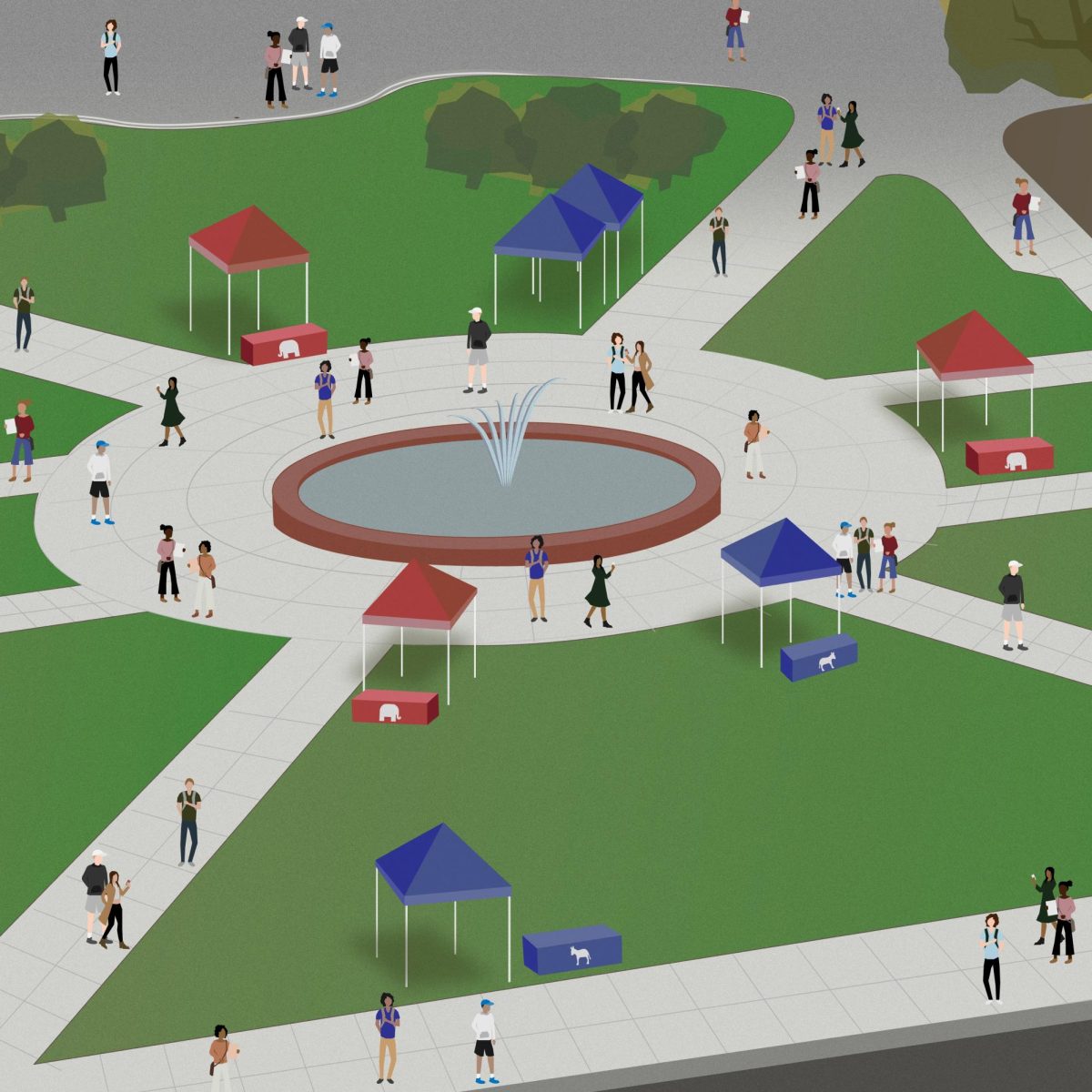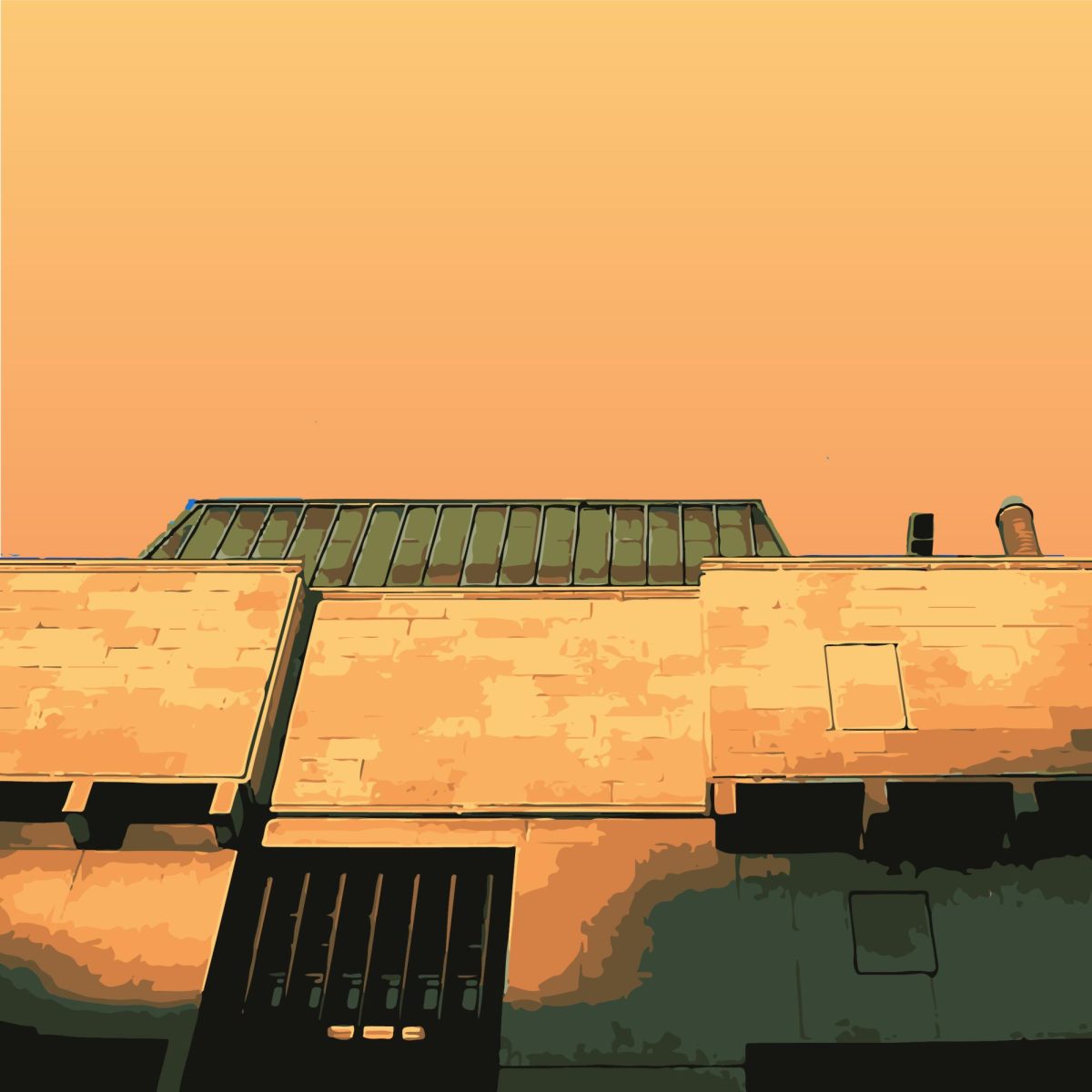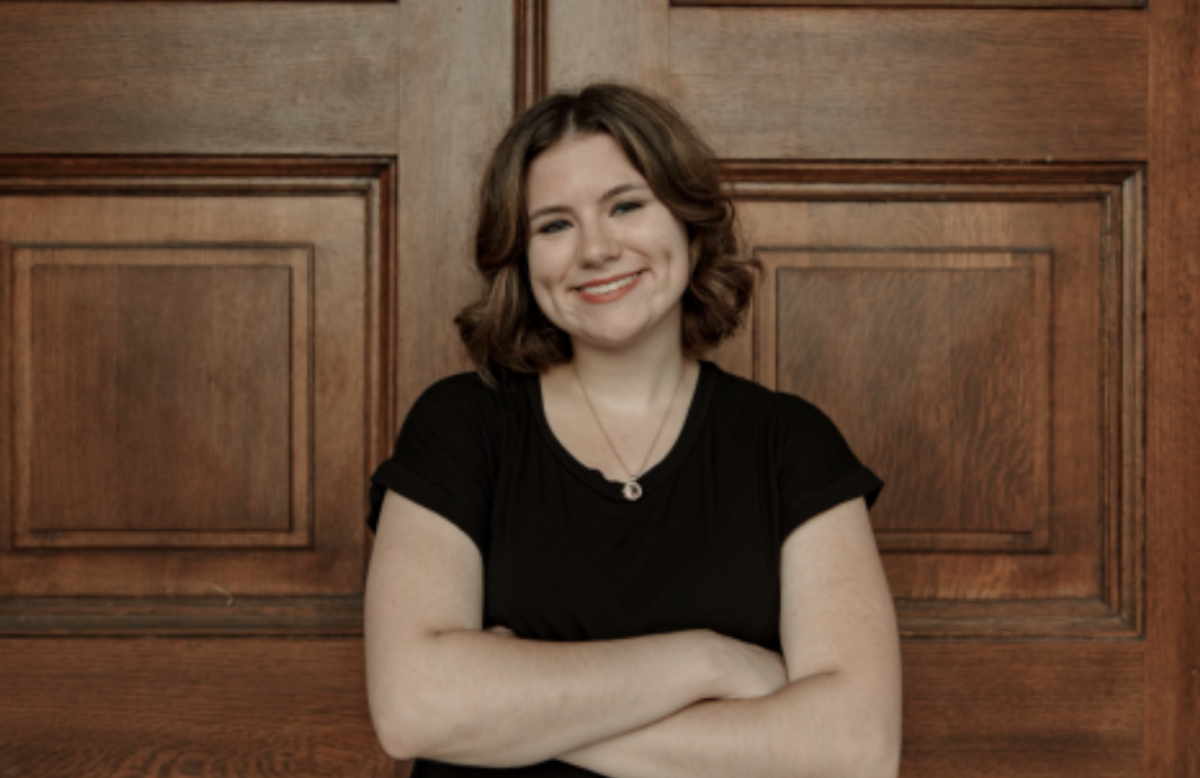It all started 120 years ago. In 1904, University of Wisconsin students protested and mocked the new landscaping on Library Mall. In 1960, students held a civil rights demonstration on Library Mall. In 1990, they protested the increasing presence of U.S. troops in the Middle East — on Library Mall.
In 2023, pro-Palestinian students and community members protested the war in Gaza. Can you guess where?
Library Mall has been a primary place for student activism, and this becomes increasingly evident during an election season. Each day, students from opposing parties or campus organizations can be seen on Library Mall — campaigning, debating and sometimes, protesting.
But somehow, student political organizations say they are still able to respectfully communicate with others across the political spectrum.
This is Library Mall’s phenomenon. And it becomes increasingly evident when compared to the hostility between major party candidates in the 2024 election — especially to those who watched the tense Sept. 10 debate between Vice President Kamala Harris and former President Donald Trump.
The Badger Herald spoke to students on opposite sides of the political spectrum to find out what Library Mall means to them.
Democrats and Republicans
UW College Democrats volunteer coordinator Ty Schanhofer said he has always had good experiences while tabling on Library Mall.
“I think we’ve got a great setup here at UW-Madison where we can have the democratic flow of ideas,” Schanhofer said. “… I’m grateful that so many students here are very civic minded and really want to talk to us about these things.”
Conservative students sometimes come up to College Democrat’s table to disagree, but they always have a civil conversation, Schanhofer said.
UW College Republicans Chair Thomas Pyle said his organization frequently collaborates with College Democrats.
“I think we have a great relationship with College Democrats right now,” Pyle said. “… I would love to see more of that in the real political world out there … We don’t need to hate our political opponents.”
College Democrats and College Republicans recently collaborated to host a 9/11 memorial on Bascom Hill, and student representatives from each organization participated in a debate last April, according to previous reporting by The Badger Herald.
The two organizations are currently working to plan a joint voter registration day where both groups would stand together at the same table and encourage students to register to vote, Schanhofer said.
“It’s always been civil with the GOP Badgers,” Schanhofer said. “We obviously see things very differently, but … both groups want to see America get better and stay a great nation.”
Schanhofer said he thinks polarization between the two groups would be unhealthy, but he said civil disagreements are necessary for finding the best solution.
UW professor of journalism and mass communication Michael Wagner agreed that it is healthy for Republican and Democratic students to interact.
“I think it’s good for College Republicans and College Democrats to advocate their views and try to talk to others about how they would like to see them vote — and answer questions from students as well,” Wagner said.
Wagner said he does not believe there is strong polarization on UW’s campus, and the majority of students tend to agree with the political demonstrations that take place, he said.
Though Wisconsin is known as a swing state, at UW, the proportion is more distinct.
Around 58% of UW students identify as somewhat or very liberal, and around 16% identify as somewhat or very conservative, according to a 2023 Student Views on Freedom of Speech survey.
Pyle, despite being part of the partisan minority on campus, said his organization has not experienced violence motivated by political beliefs.
“We’ve had people take pictures and give us weird looks and say things but never anything like to the point of violence or threat of violence,” Pyle said. “But I know that’s not the case for all people on campus. There’s been issues on both sides of that.”
In September, around 200 people visited Library Mall to watch conservative political commentator Charlie Kirk debate students as part of his You’re Being Brainwashed Tour, according to previous reporting.
Pyle said some UW students may have felt more comfortable coming out as Republicans when they are surrounded by a crowd of fellow Republicans — which could have contributed to the event’s large turnout, he said.
“We’ve had great turnout for a lot of our big speakers,” Pyle said. “We had Ben Shapiro in the past. He had phenomenal turnout. We actually had to turn people away.”
Over 1,000 people attended Shapiro’s lecture last November, and around 100 counterprotesters gathered outside of his venue — across from Library Mall — at Memorial Union, according to previous reporting.
Evangelical TikTok preacher Cindy Smock, better known as “Sister Cindy,” gathered on Library Mall last year along with a crowd of around 100 students. Smock often travels to college campuses across the nation to create TikToks advocating for abstinence — which some students find entertaining.
Schanhofer said he was not surprised to see the large turnouts for social media personalities.
“We had Sister Cindy here last spring,” Schanhofer said. “I think people love to see the spectacle. And I think that’s exactly what Mr. Kirk was going for with that event. But there are conservative, Republican students on campus.”
UW is a largely liberal campus, but Republican students often stop at College Democrats’ table to discuss their political views, Schanhofer said.
Schanhofer said he thinks it is healthy for the campus community to disagree in a respectful manner.
Israel and Palestine
Since the start of the spring encampment, students have led multiple pro-Palestinian protests and pro-Israel counterprotests.
Most recently, Students for Justice in Palestine held a protest Oct. 11 on Library Mall in which around 50 students continued to call for UW’s divestment from Israel.
Earlier that week, on the Oct. 7 anniversary of Hamas’ attack on Israel, UW Hillel Foundation held a vigil for members of the Jewish community to mourn the lives lost since the war began, according to previous reporting.
Neither SJP nor Hillel responded to a request for comment.
Schanhofer said College Democrats’ tabling efforts were not disrupted by the pro-Palestinian encampment on Library Mall.
“I wouldn’t say we lost Library Mall when the encampment went up last year,” Schanhofer said. “… People would still be there, would still want to stop and talk to us no matter what about the issues that America is facing.”
College Democrats sets up its table just outside of Library Mall, so Schanhofer said he does not think the encampment affected the group’s recruitment numbers.
Schanhofer said the group is supportive of working toward peace in the Middle East, and another encampment would be a prominent issue for the Democratic Party as well, he said.
Pyle said the encampment did interfere with College Republicans’ tabling and general presence on campus, but the group was never physically harmed.
“I even had one [officer] help me walk to Memorial Union — across it [the encampment],” Pyle said. “It wasn’t necessary or anything. Madison police have done a great job, and they just want to make sure we stay safe.”
Library Mall vs. ‘the real world’
Schanhofer said Library Mall is a unique space that lets organizations interact with a diverse selection of the university’s student population.
The space offers a contrast to real-world politics. Among Wisconsin residents, around 45% of Republicans and 41% of Democrats only converse with members of their own party.
Whereas a study by the University of California-Los Angeles found that 86.6% of left-leaning students, 82% of centrist students and 68.1% of right-leaning students said their tolerance of people with different beliefs is somewhat strong or strong.
Pyle said College Democrats and College Republicans both have the same goal — to engage and inform young voters — which he said could contribute to the groups’ ability to behave civilly with each other in comparison to the rest of the political world.
Pyle said he would like to think Harris and Trump have that same goal, but he said they are primarily focused on appealing to supporters of their party.
“Especially as we’ve seen in the last couple days with Biden calling Trump supporters garbage,” Pyle said. “We would never do that here if we want Democrat students and candidates to be informed and to understand what we represent. And I’d like to think that they think the same about Republican students.”
In an Oct. 30 phone call, President Joe Biden responded to a comedian at an Oct. 27 Trump Rally who called Puerto Rico a “floating island of garbage,” according to AP News.
“Just the other day, a speaker at his rally called Puerto Rico ‘a floating island of garbage,’” Biden said in the call. “… The only garbage I see floating out there is his supporters.”
In the professional political world, there has been a decline in bipartisanship in recent years, UW professor of public affairs Amber Wichowsky said.
“Since the 1970s there have been some changes that some suggest feed into the political polarization … the decline in bipartisanship, willingness to compromise,” Wichowsky.
Though, there is evidence that the younger generation of politicians are more successful at comprising to pass bipartisan policies, Wichowsky said.
In 2022, 40% of all bipartisan bills signed into law at the state level were introduced by a Gen Z or millennial legislator, according to the Democracy Journal.
During the College Democrats and College Republicans debate, Pyle said the two groups focused on solely policies — rather than personal attacks.
“We weren’t there to insult each other or anything like that,” Pyle. “Really, the only dig that was thrown was them speaking about abortion, and they kind of attacked us for that — which they had every right to do. And they weren’t attacking the people who spoke.”
Wichowsky also said congressional lawmakers do not hold the same shared identity as college students — in UW’s case, their identity as Badgers.
Pyle agreed and said the university’s environment and student organization fair does play a role in facilitating respectful dialogue between parties.
“I think that our identity as Badgers, our school spirit plays into a lot of why we’re able to get along so well,” Pyle said. “I think, at the same time, the club org fair … is really important.”
But why Library Mall?
Wagner said Library Mall could be the predominant place for student political expression because it is heavily frequented by students, and is a place where many students expect to be able to freely share their beliefs.
“If you want people to see your message, that’s [Library Mall] a great place to be, because lots of folks pass through it every day, and it’s an open, open space where people have come to expect others to be sharing their ideas,” Wagner said.
Both Pyle and Schanhofer said their organizations table on Library Mall because it is a highly-populated area and because the university labels it as a “designated public forum.”
UW defines designated public forums as areas of campus open to any type of speech and debate, but the university can impose logistical restrictions on the event’s time, place or “manner of speech,” according to UW’s Free Expression website.
“We don’t need to get a real permit or anything,” Schanhofer said. “We’re able to just be there and talk about ideas, because we’re students here, and they [UW] make it really easy for us to be in that spot.”
The Wisco Project is a newly created nonprofit organization that can also be seen tabling on Library Mall almost every weekday leading up to the election.
The organization aims to increase voter turnout among students in Wisconsin, according to its website. The Wisco Project has raised almost $2 million in 2024, according to independent expenditures reports from Open Secret.
The Wisco Project did not respond to a request for comment.
In an email, director of the Rebecca M. Blank Center for Campus History Kacie Lucchini Butcher said Library Mall has become the impromptu spot for student political expression.
“The university didn’t design it for that type of gathering … and students didn’t seek to make it a space for political expression exclusively,” Lucchini Butcher said in the email.
According to Lucchini Butcher, the space has been underutilized, and the university is currently planning another large-scale redesign.
The plan includes a larger public gathering space with new seating, lighting, and recreation lawn areas, according to the plan summary. There have been previous redesigns to Library Mall in 1984, 1996 and 2005 — which, according to the summary, indicate this area’s long-established identity as a major public and civic gathering space.
In order for universities to strike the balance between allowing freedom of political expression while also promoting unity on campus, Wagner said it is important to recognize that students can be unified on many topics that are not related to politics.
For example, students can come together on sports teams, student clubs or even in admiration for the scenic overlook on Lake Mendota, Wagner said.
According to Luccihini Butcher, Library Mall’s location primes it to be a unifying space on campus.
“Library Mall is centrally located and ‘in the thick of it,’” Lucchini Butcher said in the email. “… You’re just as likely to see someone sunbathing or enjoying lunch from a food cart as you are to see someone protesting or campaigning on behalf of a political movement.”
And that is how for over 120 years, even when students protest and disagree, they all have one thing in common — Library Mall.








